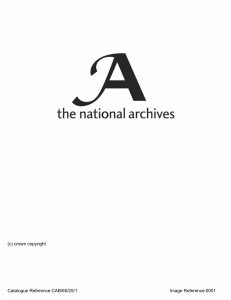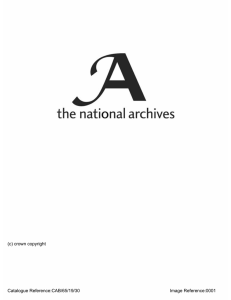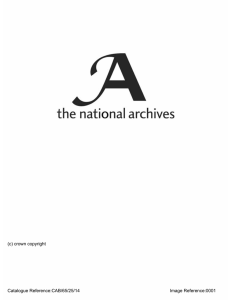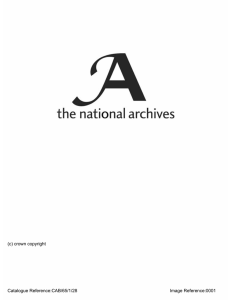(c) crown copyright Catalogue Reference:CAB/65/1/42 Image Reference:0001
advertisement
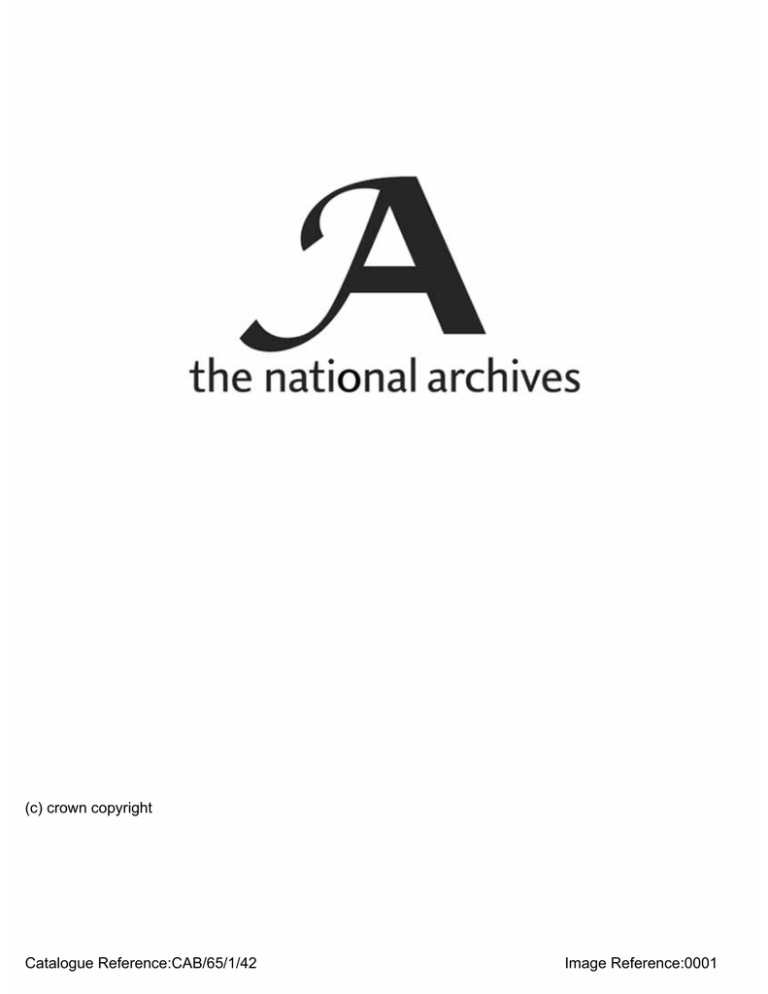
(c) crown copyright Catalogue Reference:CAB/65/1/42 Image Reference:0001 TO, IBB E ^ f , P M M ILOOES AKIB Mff, It is requested that special oare may be taken to ensure the secrecy of this document. W A R CABINET 32 (39). CONCLUSIONS of a Meeting of the War Cabinet held at 10Downing Street, S.W. 1, on Monday, October 9, 1939, at 11 -30 A M . Present: The Right Hon. N E V I L L E CHAMBERLAIN, The Right Hon. Sir J O H N S I M O N , K.C., M.P;, Chancellor of the Exchequer. Admiral of the Fleet the Right Hon. L O R D C H A T F I E L D , Minister for Coordination of Defence. The Right Hon. L. H O R E - B E L I S H A , M.P., Secretary of State for War. The Right Hon. Sir S A M U E L H O A R E , Bt., M.P., Lord Privy Seal. M.P., Prime Minister (in the Chair). The Right Hon. V I S C O U N T H A L I F A X , Secretary of State for Foreign Affairs. The Right Hon. WINSTON S. C H U R C H I L L , M.P., First Lord of the Admiralty. The Right Hon. Sir K I N G S L E Y W O O D , M.P., Secretary of State for Air. The Right Hon. L O R D HANKEY, Minister without Portfolio. The following were also present: The Right Hon. Sir J O H N A N D E R S O N , M.P., Secretary of State for the Home Department and Minister of Home Security. Sir HORACE J. W I L S O N , Permanent Secretary to the Treasury. Admiral of the Fleet Sir D U D L E Y First Sea Lord and Chief of Naval Staff (Items 1-7). POUND, The Right Hon. A N T H O N Y E D E N , M.P., Secretary of State for Dominion Affairs. Air Chief Marshal Sir C Y R I L L. N . N E W A L L , Chief of the Air Staff (Items 1-7). General Sir W . E D M U N D I R O N S I D E , Chief of the Imperial General Staff (Items 1-7). Secretariat. Sir E D W A R D BRIDGES . Major-General H . L. I S M A Y . Captain A . D . N I C H O L L , R . N . G, N. FLEMMrNG. WAR GABIMlf (89). m CONTENTS. Minute No. Subject. 1 The Air Situation 2 The Naval Situation ... Page. ..." ... ... ... ... ...... ... 339 ... 339 German surface vessel in South Atlantic. S.S. Iroquois. 3 The Military Situation ... 339 U.P. weapon. 4 5 6 Transfer of A . A . Guns from Air Defence of Great Britain to France ... ... . . . . . . 340 Negotiations with the Turkish Mission under General Orbay ... ... ... ... ... 340 Turkey 341 ... ... ... ... ... Turco-Soviet Conversations and the Anglo-Franco-Turkish Treaty. 7 The Sino-Japanese Conflict . . . . . . . . . 8 Herr Hitler's Speech to the Reichstag, October 6, 1939 ... Draft Statement on behalf of His Majesty's Government. 0 342 342 S Reference: naa been reported W.M.; (39.) 4lst had; returned, safely ; Conclusions, Minute 1.) 3gl A reconnaissance of road and rail movements in North-West Ger-manyAadbeen carried'out-the-.previous day. by- aircraft of the -Boyal A i r Force component of.the Field Force. A l l aircraft taking part had.-returned, safely. - The results-of the reconnaissance were, not yet known. A'. - '..'..,. .-''-1 The W a r Cabinet took note of this statement. 2. The First Lord of the Admiralty said that the strong Naval forces which had been sent but to intercept the German force, referred to in the previous Minute, had also failed to make (Previous contact. It was probable that the German ships had returned to Reference: W . M . (39) 41st harbour. No attacks had been made on our ships in the previous Conclusions, Minute 2.) twenty-four hours. There now appeared to be little doubt that the German ship German Surface Vessel in South reported in the Southern Atlantic was the Admiral Scheer. Nine hunting units had been sent out. Atlantic. Situation. (Previous Reference: W . M . (39) 40th Conclusions, Minute 2.) S.S. Iroquois. (Previous Reference: W . M . (39) 39th Conclusions, Minute 3.) The United States liner Iroquois had been met by an escort of United States destroyers; a thorough search of the vessel had taken place and no bombs had been found. The W a r Cabinet took note of this statement. 3. The Chief of the Imperial General Staff said that during - his recent visit to the British sector of the line in France he had (Previous found a much greater advance in' the preparation of the defences Reference: by the French than he had expected. Although our ttoops,.had now W.M. (39) 41st taken over the sector, the French engineer units were carrying On Conclusions, with uncompleted works. Our own engineer units were in full Minute 3.) operation and the work would be pressed forward as rapidly as possible. \ The Chief of the Imperial General Staff gave the W a r Cabinet a brief description? of the layout of the defence line in the British sector. He laid particular emphasis on the shortage of effective weapons against low-flying attack. In conclusion, he said that he had.found the Field - Force - in great, heart and he was. more: than AcL.A -A?AatisfiedAdtA The Military Situation. U.P. Weapon. The Prime Minister asked what progress had been made in the . development of the-U.P. weapon. he' Chief of the Air Staff said that.considerable progressAad ^^eefrfnild aade. Hitherto the development of the high-altitude weapon had been the main consideration, but it was now under considera­ oonAis s U A - ^ s tocnncsni on the lo 7-altkiade - 4, The Chief of the Air-Staff reminded-the WjMr- Cabinei that at the second meeting of the Supreme ; W a r Council on the 22nd September the French had asked for additi( ;ipnal Britislt;. AIA^­ inch A.A, guns. guns to be sent to France. m;'ord^-:-to';i^Kove;:F^ We had already been able to go some distance towards meeting the French requestj&hdditheCniefs of Staff had been eMmihing whether more could not be done. It would no doubt have an excellent political effect if some further concession could be made to the French following upon the recent meeting with General Gamelin. The Chiefs of Staff recommended that 48 3-inch guns should be released from the Air Defence of Great Britain, of which 40 would be allotted to the Advanced A i r Striking Force area and 8 to the British Expeditionary Force area. In the course of the discussion which ensued it was pointed out that the output of 3-7-inch guns would be about 80 per month, and personnel was ready to take them over as soon as the guns were produced. The subtraction from the Air Defence of Great Britain would therefore very quickly be made up. Some of the areas from which the guns were to be withdrawn were admittedly very important, but it was necessary to balance up the risks all the way round and to spread our resources accordingly. : IDafenoe of Gi&at IMt&ln to Itaoe. (Previous Beference: W.M. (39) 29th Conclusions, Minute 6.) 1 The War Cabinet agreed— (i) To authorise the W a r Office and the A i r Ministry to take immediate steps for the release of 48 3-inch guns from the Air Defence of Great Britain and their transfer to the British forces in France. (ii) That the French should be informed forthwith of this decision. Negotiations 5. The W a r Cabinet had under consideration a.Note'.by.-the with the Turkish Chiefs of Staff dealing with the negotiations with the Turkish Mission under Mission (Paper W.P. (39)76). General Orbay. (Previous Beference: W . M . (39) 32nd Conclusions, Minute 14.) The Chief of the Air Staff said that the officers who were negotiating with General Orbay had been originally instructed to play for time until the Treaty had been signed. A t that time it had been anticipated that the Treaty would be signed very shortly. Now, however, that signature was clearly going to be delayed for a long time, we could not keep General Orbay in play indefinitely. His first mission had failed, and if this one was equally unsuccessful there was a grave danger that the Turkish General Staff, Who carried great weight in Turkey, would turn against us. Ilhe Chiefs of Staff considered that we Should now proceed on the assumption that the Treaty would be signed. There was admittedly a risk in doing this, since the Turks might back out at the last moment. But we could then always either stop shipment of the munitions or recall anywhich had nbt actually arrived in Turkey. : -The Chancellor of ike Exchequer observed that the proposals contained in paragraph 10 of the Chiefs of Staffs Hole meant ill i,t . we- might. Have.to consent to the.'Turks placing orders up to the-full­ amount of £25 millions and taking deliveries in advance of the signature of. the Anglo-French Credit Agreement with Turkey. ' It was KOWM %i Oai, at kato a fcifere deliveries?! JHBHtafcra bbbbitbS fbbDv TAe Chief of the Air Staff, in answer to. a question by the '. Chancellor of the Exchequer, said that the French were acting Jointly with us ia the negotiations with General Orbay aiabl ttet it was hoped that they would take the same line as ourselves over the -bjiebbib^ - 'V."'; aT$ie\ : ^^ .b To approve the instructions proposed by the Chiefs of Stall ;for' the. British Permanent Military - JSepresehtatives - in their discussions-: with General Orbay as-set out in paragraph W o f their Mote TPurco-Boviet Conversations and the Anglo­ JVaneb-Turkish Treaty, : ' ' ' (Previous Beference: W . M . (39) 39th Conclusions, Minute 11.) 6. In connection with the preceding Minute the Secretary of State for Foreign Affairs drew attention to the following communications:­ (1) Telegram No. 581 from Ankara, reporting that decided to send to the Affairs at Moscow the 10th O c t o b e r : ­ His Majesty's Ambassador, the Turkish Government had Turkish Minister for Eoreign following instructions on the (a) if we and the French agreed to the modifications proposed, he was to stay and sign the TurcoSoviet Treaty: (b) if we refused, he was to leave at once: (c) if we returned no reply to the Turkish enquiry, he was equally to leave at once. (2) Telegram No. 495 to His Majesty's Ambassador, Ankara, reporting that the Turkish Ambassador in London had informed the Foreign Secretary that he had been instructed to give an assurance that, if the proposed changes were made in the Anglo-Franco-Turkish Treaty, they would not in practice involve any change in the scope and sense of the undertakings between our Governments. (3) Telegram No. 372 from His Majesty's Ambassador, Moscow, reporting an interview which he and the French Charge^ d'Affaires had had with the Turkish Minister for Foreign Affairs. The latter had suggested that the French and ourselves should authorise him to tell Stalin orally that we agreed to the new wording of the Reserve Clause, Negotiations for the Turco-Soviet Treaty could then be pressed forward, and the text, when it emerged, could be submitted for the approval of the French and British Governments. If they took objection to anything in the draft Treaty, they could withdraw their previous oral approval. The Ambassador, who was not in favour of any further delay, supported this proposal. The Secretary of State for Foreign Affairs, took the view that we should act quickly in this matter, and that if we did so we should probably secure the Treaty with Turkey. The French were coming round to our point of view, and there was every reason to believe that the Turks were playing straight with us over their negotiations with Russia. W e should be fully safeguarded, under M. Sarajoglu's ^ m p l ^ ^ ^ P ^ ^ i i i t of the Turco-Soviet Treaty containing' 91!!^ ',vb,b^bb-. b bb;:bV-:b^i.;:': : Authorised the Secretary of State for Foreign Affairs to accept the suggestion set out in Telegram No. 372 from blbfc^bbb^ bbb'-.'' W a r Cabinet that he Sad" telegraphs Tokyo, stating that, in view of /the: doubt astohwHether the inter (Previous Reference: W . M . (39) 34th Conclusions, Minute 11.) Here Hitler's Speech to the Reichstag, 6th October, Draft Statement on behalf of H i s Majesty's Government. (Previous Reference: W . M . (39) 40th Conclusions, Minute 7.) n ^ d i a r y w i ^ w t a f e h d been in touch m regard/to t h e p r o S : : a ft Japanese Government, he considered it would be better " " ^ Pfnghai, should not broach the SIX * l . a n g Kai-shek during his present visit to Chungking, at least until the situation became clearer. The W a r Cabinet took note of the above statement. £weS^rSE.? r ? G e e r a 1 1 Chl 8. The War-Cabinet had before them the draft of a Statement, to be made on behalf of His Majesty's Government in reply to Herr Hitler's speech in the Reichstag (Paper W.P: (39)77); The Secretary of State for Foreign Affairs^ explained that he had since received a copy of a further draft prepared by the First Lord of the Admiralty. It was agreed that the most helpful course would be to have a discussion as to the general lines of the Statement, andnot to deal with drafting points. The Prime Minister drew attention to three main considera­ tions: First, that he thought that, as the speech had aroused an unfriendly or critical reaction throughout the world, except perhaps in Italy, we should be justified in taking a somewhat stiffer tone in our reply than if the speech had revealed any serious cleavage of opinion. Secondly, that Herr Hitler's speech said in effect that there was to be no further discussion about Poland, as her future was the concern of Germany and Russia exclusively. Our reply should draw attention to this, and make quite clear that it was an impossible basis for starting peace negotiations, though we should not, on the other hand, commit ourselves to any specific solution of the Polish problem. He would not rule out the possibility of a similar reference to Czecho-Slovakia, but would emphasise that Germany's actions in Poland were the immediate background with which we were at present concerned. Thirdly, that, in regard to the more general proposals in Herr Hitler's speech, the answer should be that it would be no use discussing them, since it was impossible to believe anything that Herr Hitler said. This should be illustrated by reference to his past words and deeds. An essential preliminary to any discussion would heed to be actions which would be evidence of Germany's intention to abandon the policy of domination by force, to accept discussion and to abide bytheir­ words. W e should avoid any precise statement of our war aims. The First Lord of the Admiralty expressed his general agree-, ment with the Prime Minister's p o i n t s . H e r r Hitler's proposals fell far-short ofwhat had,been suggested,in some quarters as likely to come from him, and opinion in- alt parties, in: this country-and also in-the Dominions, and in neutraP, countries was clear "that it was/no use holding discussions with..Herr' -2Mtier, until he showed by his actions that his policy had.changed.. His,; that the reply should be more definite than he had contemplated even a few days previously, and that we should:'not attemptto - 'mano2uvre - in-;order to gain time..-. . ' h. Thcfc c-7 ag IS ar points -i do zJozi­ : - ; : : 11 1 IIIIIIIHIIHII Mllif *I ; 3frj^A we­ S d ^ S t e and that this would have to be done in very general terras, as, (for example, that we were fighting for the restoration of the life and sovereignty of Poland. The Secretary of State for Dominion Affairs thought that it was a general statement on these lines that Mr. Mackenzie King, in his telegram of 'the.-'7th October,' had' been' anxious to see included'' in'. our reply. (ii) It was agreed that, while the tone of the reply should be ' very firm; it should: not definitely shut, the door, - but should make it clear that-.it was for-Herr Hitler-to. give-a reply to our answer. (iii) One way to test the statement would be to look at it from the point of view of the average German, who might ask on what basis could peace be obtained, short of a peace imposed at the end pf a long and bloody war. I t must emerge from our statement that Prance and ourselves were not.prepared to make peace unless there jwas some guarantee for the continuance of real peace thereafter. No doubt it would occur to many Germans that the easiest way to achieve this would be to get rid of Hitler ism. (iv) The Secretary of State for Foreign Affairs said that the French Governments attitude was one of anxiety that our reply was to be postponed as long as "Wednesday. In further discussion, he said that he would be reluctant to abandon altogether the suggestion that non-belligerent Powers would be associated at the Peace Conference. No doubt this would let in Russia; but could we hope to exclude Russia altogether ? He was anxious to include the United States of America; he also had in mind the section of opinion in Germany which took the view that, if they abandoned the Nazi regime, tlie result would be another Versailles. (v) On the other hand, it was suggested that French opinion might be sensitive on this point, having regard to the fact that at the end of the last war the United States Government had with­ drawn from their promise to guarantee the Franco-German frontier. (vi) The Secretary of State for Foreign Affairs said that the French did not ask to be shown a complete draft of our reply. He had therefore instructed Sir Alexander Cadogan to inform M. Corbin of the general lines of the statement, which had been prepared. He agreed that it might be necessary that key sentences should be submitted to the French Government. The W a r Cabinet agreed :— (a) To remit the drafting of a revised Statement, in the light of the discussion which had taken place, to the Prime Minister, the Chancellor of the Exchequer, the Secretary of State for Foreign Affairs and the First Lord of the Admiralty, with a view to the revised draft being submitted to the War; Cabinet on Tuesday, the 10th October; (&) That the Statement should be made by the Prime Minister on Wednesday, the 11th October. (c) To invite the Secretary of State for Dominion Affairs to send further particulars as to the lines of the Statement to the Dominion Premiers that evening, after the Meeting of the Drafting Committee referred to in (a). :

